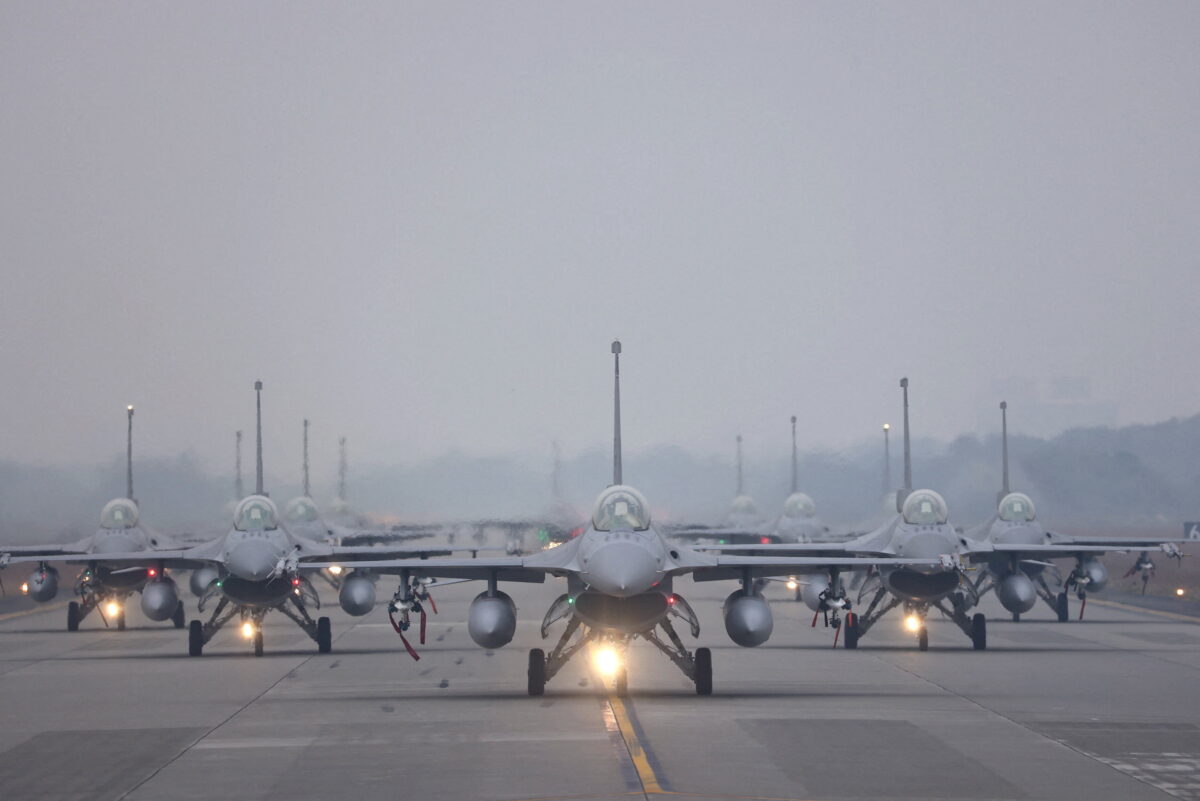The Importance of Pelosi’s Visit to Taiwan
CommentarySpeaker Pelosi’s visit to Taiwan reaffirms U.S. commitment to the island nation and reveals China to be a paper tiger. China threatened military action if Speaker Pelosi visited Taiwan, but this didn’t stop her. This visit represents the highest level U.S. visit in 25 years. The Trump administration had accelerated weapons sales to Taiwan and also placed uniformed U.S. military personnel on the island for the first time since 1979. President Donald Trump also refurbished the U.S. representative office in Taiwan to the tune of $256 million. After he was no longer in office, it was discovered that Trump had stationed U.S. special forces trainers in Taiwan. Since taking office, the Biden administration has continued weapons sales and increased the number of U.S. troops stationed on the island. Trump, and later President Joe Biden, convinced NATO to expand their mandate toward countering China. Both administrations also strengthened the Quad, the Five Eyes, and Aukus security pacts aimed at China, eliciting deeper commitment from the United States and its allies: the UK, Australia, New Zealand, Japan, and India. The U.S. Taiwan Relations Act obligates the United States to provide weapons to Taiwan, but it is unclear if it requires the United States to fight for Taiwan. While the U.S. relationship with Taiwan has always been one of strategic ambiguity, under the Biden administration, it has become less ambiguous with Biden stating publicly, several times, that the United States would defend Taiwan. The White House later walked back these statements, but the Pelosi visit to Taipei seems a near-confirmation that the United States is fully committed to Taiwan. The late Shinzo Abe called for the United States to end strategic ambiguity and state publicly whether the United States would fight for Taiwan or not. Abe’s request came as Japan increasingly recognized that a threat to Taiwan is a threat to Japanese security. A Chinese invasion of Taiwan would necessitate the PLA violating Japanese sea and air space, which Japan is committed to defend. And, while the terms of the Taiwan Relations Act (TRA) may be vague on whether or not the United States would fight for Taiwan, the United States is treaty-bound to defend any territory controlled by Japan. 12 F-16V fighter jets perform an elephant walk during an annual New Year’s drill in Chiayi, Taiwan, on Jan. 5, 2022. (Ann Wang/Reuters) The dominos are stacked like this: If the PLA invades Taiwan, they will violate Japanese territory, and the Japanese Self Defense Force would engage. If Japan fights, the United States is obligated to fight. So, at the very least, a Chinese invasion of Taiwan would pit China against the combined militaries of the United States, Japan, and Taiwan. An invasion requires the PLA-Navy to control the Taiwan Strait. The UK, Australia, New Zealand, Japan, Indonesia, and even Holland have participated in U.S. naval operations in the region, making it very likely that those countries would also join in the fight. With China’s economy grinding down, and the very real threat of U.S. economic sanctions, China is in no position to fight what could quickly escalate into a world war. At the moment, according to world firepower rankings, the United States is the most powerful nation, Russia second, and China third. The Ukraine war has shown the world that a small country can oppose a world power thanks to weapons and support from the United States, E.U., and NATO. Even without the involvement of foreign troops, Ukraine has achieved the unlikely goal of holding out for months against Russia. The Kremlin’s humiliation in Ukraine is thought to have already deterred China’s invasion of Taiwan. In addition to this, the very real likelihood of facing combined western and Japanese forces makes an invasion even less likely. However, there are other options available to China. China could retaliate by blockading Taiwan, essentially starving them into submission. This is unlikely though because of the U.S. naval dominance in the region. The reason for the U.S. freedom of navigation exercises is that 48 percent of the world’s containerized shipping passes through the Taiwan Strait. By blocking the Strait, China would be choking worldwide shipments. This is something that neither the United States nor its allies would tolerate. Apart from military action, China could bring economic sanctions against the United States. But banning Chinese exports to the United States would hurt China more than the United States. In fact, terminating exports to the United States would be a Godsend for those who want the United States to cut its supply-chain dependence on China and re-shore its manufacturing. About 20 percent of China’s GDP is dependent on exports, with nearly 17 percent of those exports going to the United States. The cessation of exports to the United States would cause a direct loss of about 3.5 percent of China’s GDP while the knock-on effect ac

Commentary
Speaker Pelosi’s visit to Taiwan reaffirms U.S. commitment to the island nation and reveals China to be a paper tiger.
China threatened military action if Speaker Pelosi visited Taiwan, but this didn’t stop her. This visit represents the highest level U.S. visit in 25 years.
The Trump administration had accelerated weapons sales to Taiwan and also placed uniformed U.S. military personnel on the island for the first time since 1979. President Donald Trump also refurbished the U.S. representative office in Taiwan to the tune of $256 million. After he was no longer in office, it was discovered that Trump had stationed U.S. special forces trainers in Taiwan. Since taking office, the Biden administration has continued weapons sales and increased the number of U.S. troops stationed on the island.
Trump, and later President Joe Biden, convinced NATO to expand their mandate toward countering China. Both administrations also strengthened the Quad, the Five Eyes, and Aukus security pacts aimed at China, eliciting deeper commitment from the United States and its allies: the UK, Australia, New Zealand, Japan, and India.
The U.S. Taiwan Relations Act obligates the United States to provide weapons to Taiwan, but it is unclear if it requires the United States to fight for Taiwan. While the U.S. relationship with Taiwan has always been one of strategic ambiguity, under the Biden administration, it has become less ambiguous with Biden stating publicly, several times, that the United States would defend Taiwan. The White House later walked back these statements, but the Pelosi visit to Taipei seems a near-confirmation that the United States is fully committed to Taiwan.
The late Shinzo Abe called for the United States to end strategic ambiguity and state publicly whether the United States would fight for Taiwan or not. Abe’s request came as Japan increasingly recognized that a threat to Taiwan is a threat to Japanese security. A Chinese invasion of Taiwan would necessitate the PLA violating Japanese sea and air space, which Japan is committed to defend. And, while the terms of the Taiwan Relations Act (TRA) may be vague on whether or not the United States would fight for Taiwan, the United States is treaty-bound to defend any territory controlled by Japan.

The dominos are stacked like this: If the PLA invades Taiwan, they will violate Japanese territory, and the Japanese Self Defense Force would engage. If Japan fights, the United States is obligated to fight. So, at the very least, a Chinese invasion of Taiwan would pit China against the combined militaries of the United States, Japan, and Taiwan. An invasion requires the PLA-Navy to control the Taiwan Strait. The UK, Australia, New Zealand, Japan, Indonesia, and even Holland have participated in U.S. naval operations in the region, making it very likely that those countries would also join in the fight.
With China’s economy grinding down, and the very real threat of U.S. economic sanctions, China is in no position to fight what could quickly escalate into a world war. At the moment, according to world firepower rankings, the United States is the most powerful nation, Russia second, and China third. The Ukraine war has shown the world that a small country can oppose a world power thanks to weapons and support from the United States, E.U., and NATO. Even without the involvement of foreign troops, Ukraine has achieved the unlikely goal of holding out for months against Russia. The Kremlin’s humiliation in Ukraine is thought to have already deterred China’s invasion of Taiwan. In addition to this, the very real likelihood of facing combined western and Japanese forces makes an invasion even less likely.
However, there are other options available to China. China could retaliate by blockading Taiwan, essentially starving them into submission. This is unlikely though because of the U.S. naval dominance in the region. The reason for the U.S. freedom of navigation exercises is that 48 percent of the world’s containerized shipping passes through the Taiwan Strait. By blocking the Strait, China would be choking worldwide shipments. This is something that neither the United States nor its allies would tolerate.
Apart from military action, China could bring economic sanctions against the United States. But banning Chinese exports to the United States would hurt China more than the United States. In fact, terminating exports to the United States would be a Godsend for those who want the United States to cut its supply-chain dependence on China and re-shore its manufacturing. About 20 percent of China’s GDP is dependent on exports, with nearly 17 percent of those exports going to the United States. The cessation of exports to the United States would cause a direct loss of about 3.5 percent of China’s GDP while the knock-on effect across the rest of the economy would be even greater.
Speaker Pelosi’s visit to Taiwan sends a clear message that U.S. foreign policy is determined in Washington, not Beijing. The CCP is now left with no better options than issuing strongly-worded protests and more idle threats, transforming them from a want-to-be world power to a mouse that roared.
Views expressed in this article are the opinions of the author and do not necessarily reflect the views of The Epoch Times.












